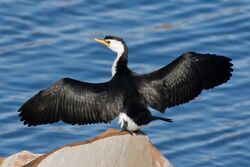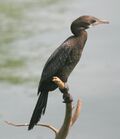Biology:Microcarbo
| Microcarbo | |
|---|---|

| |
| Little pied cormorant Microcarbo melanoleucos | |
| Scientific classification | |
| Domain: | Eukaryota |
| Kingdom: | Animalia |
| Phylum: | Chordata |
| Class: | Aves |
| Order: | Suliformes |
| Family: | Phalacrocoracidae |
| Genus: | Microcarbo Bonaparte, 1856 |
| Type species | |
| Pelecanus pygmaeus (pygmy cormorant) Pallas, 1773
| |
| Species | |
|
See text | |
| Synonyms | |
|
Nanocorax (in part) | |
Microcarbo is a genus of fish-eating birds, known as cormorants, of the family Phalacrocoracidae. The genus was formerly subsumed within Phalacrocorax.
Microcarbo has been recognized as a valid genus by the IOC's World Bird List[1] on the basis of work by Siegel-Causey (1988), Kennedy et al. (2000), and Christidis and Boles (2008).
As suggested by the name, this genus contains the smallest of the world's cormorants. It is also the most basal, having diverged from the rest of the family between 12.8 to 15.4 million years ago.[2]
Taxonomy
The genus Microcarbo was introduced in 1856 by the French naturalist Charles Lucien Bonaparte with the pygmy cormorant as the type species.[3][4] The name combines the Ancient Greek mikros meaning "small" with the genus name Carbo that was introduced by Bernard Germain de Lacépède in 1789.[5]
The genus contains five species.[1]
List of species
| Image | Scientific name | Common Name | Distribution |
|---|---|---|---|
 |
Microcarbo coronatus | Crowned cormorant | Cape Agulhas north to Swakopmund along the coast of southern Africa |
 |
Microcarbo niger | Little cormorant | Indian Subcontinent east to Java |
 |
Microcarbo melanoleucos | Little pied cormorant | New Zealand, from Stewart Island to Northland, mainland Australia, Tasmania and Indonesia |
 |
Microcarbo pygmaeus | Pygmy cormorant | south-east of Europe (east of Italy) and south-west of Asia, in Kazakhstan, Tajikistan, Turkmenistan, and Uzbekistan |
 |
Microcarbo africanus | Reed cormorant | Africa south of the Sahara, and Madagascar |
- †Serventys' cormorant, Microcarbo serventyorum
References
- ↑ 1.0 1.1 Gill, Frank; Donsker, David; Rasmussen, Pamela, eds (August 2021). "Storks, frigatebirds, boobies, darters, cormorants". IOC World Bird List Version 12.2. International Ornithologists' Union. https://www.worldbirdnames.org/bow/storks/.
- ↑ Kennedy, Martyn; Spencer, Hamish G. (2014-10-01). "Classification of the cormorants of the world" (in en). Molecular Phylogenetics and Evolution 79: 249–257. doi:10.1016/j.ympev.2014.06.020. ISSN 1055-7903. PMID 24994028. https://www.sciencedirect.com/science/article/abs/pii/S1055790314002334.
- ↑ Bonaparte, Charles Lucien (1856). "Excusion dans les divers Musées d'Allemagne, de Hollande et de Belgique, et tableaux paralléliques de l'ordre des échassiers (suite)" (in French). Comptes Rendus Hebdomadaires des Séances de l'Académie des Sciences 43: 571–579 [577]. https://www.biodiversitylibrary.org/page/1211113.
- ↑ Mayr, Ernst; Cottrell, G. William, eds (1979). Check-List of Birds of the World. 1 (2nd ed.). Cambridge, Massachusetts: Museum of Comparative Zoology. p. 163. https://www.biodiversitylibrary.org/page/16108803.
- ↑ Jobling, James A. (2010). The Helm Dictionary of Scientific Bird Names. London: Christopher Helm. p. 253. ISBN 978-1-4081-2501-4. https://archive.org/stream/Helm_Dictionary_of_Scientific_Bird_Names_by_James_A._Jobling#page/n253/mode/1up.
- Christidis, L., and W. E. Boles. 2008. Systematics and taxonomy of Australian birds. CSIRO Publishing, Collingwood, Victoria, Australia.
- Kennedy, M., R. D. Gray, and H. G. Spencer. 2000. The phylogenetic relationships of the shags and cormorants: can sequence data resolve a disagreement between behavior and morphology? Molecular Phylogenetics and Evolution 17: 345–359.
- Siegel-Causey, D. 1988. Phylogeny of the Phalacrocoracidae. Condor 90: 885–905. Available at [1] (Accessed 13 May 2010).
Wikidata ☰ Q128189 entry
 |

